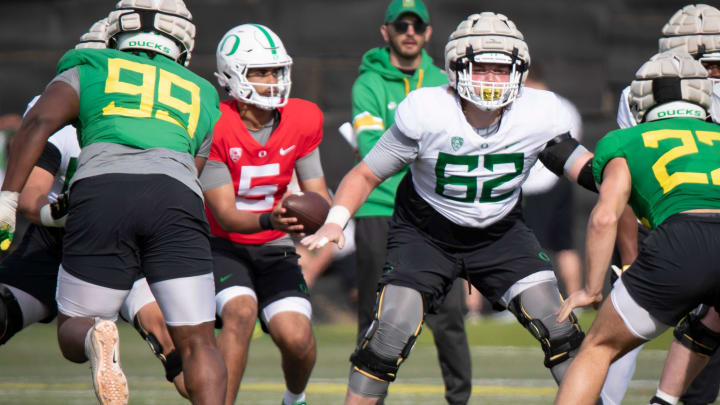Does Oregon Football Need To Get Bigger To Compete In The Big Ten?

Now that the Ducks’ entry into the Big Ten Conference is official, the conversation continues about whether Oregon, Washington, USC, and UCLA can field teams to challenge for a Big Ten title and/or a spot in the newly expanded 12-team College Football Playoffs. Of the four, Oregon is considered to have the best chance for success.
As noted in a recent ESPN story, the first obstacle for the Ducks to overcome is the perception that all Pac-12 teams were built on speed and finesse. While that may have been true several years ago, teams like Oregon have already taken steps to change the narrative. The Ducks, for example, started the switch with the hiring of coach Mario Cristobal, a top recruiter and offensive line coach. Following his departure to take the Miami job, the Ducks hired Dan Lanning, who realizes the importance of controlling the line of scrimmage on both sides of the ball.
"Ultimately, in my opinion, winning football is winning football, and it starts in the trenches,” Lanning said. “You have to be big up front. You have to be able to win on the line of scrimmage. I don't think that formula changes.”
While the Big Ten has made changes to their offensive philosophy, they still believe games are won thanks to the play of big-bodied players. Consider that Michigan’s physical play in their national championship game against Washington only furthered that narrative.
Coaches for incumbent Big Ten teams seem to have varying opinions of the new kids on the block. Some believe there isn’t a problem.
"They're not going to have a size issue,” Purdue coach Ryan Walters told ESPN of the West Coast newcomers.
On the other hand, others see it differently.
"The physicality in this league is something that stands out to people from the outside world, when you come in," Illinois coach Bret Bielema said. "It's just a different game, out there [on the West Coast], than what the Big Ten does."
Perhaps some of the highest praise for Oregon comes from CBS analyst, Aaron Taylor, an All-American tackle at Notre Dame who played in the NFL and founded the Joe Moore Award, given to the nation's top collegiate offensive line unit.
“Oregon’s built well up front,” Taylor said. “They can compete for (the Big Ten) title and compete for a national title this year on the lines of scrimmage.”
Consider that Oregon’s offensive line was a finalist for the Joe Moore Award in 2023, averaging just six yards per carry and only allowing five sacks throughout the entire season. The Ducks, led by right tackle Ajani Cornelius, Josh Conerly, left tackle, Marcus Harper at left guard, Iapani Laloulu, center, and Matthew Bedford, right guard, are considered one of the favorites for the 2024 award.
Geoff Schwartz, a former offensive lineman at Oregon and in the NFL, who works as an analyst for SiriusXM and Fox Sports, also agreed that the Ducks are best prepared for this transition. As a defensive coordinator, Lanning has developed his own strategy on how best to use his players. He told Schwartz that he wants frequent rotations up front. For example, he believes that defensive linemen should play a maximum of 40 snaps per game, which is the same approach Lanning used as Georgia’s defensive coordinator when the Bulldogs won the national title in 2021.
Lanning also recognizes the challenges of playing a full schedule in a conference that shows no mercy. For example, three of Lanning’s five losses during his relatively short tenure with the Ducks occurred on Nov. 12 or later.
"We always want to be bigger," Lanning told ESPN. "It wasn't like we had to change what we're doing, because at the end of the day, that's the same thing that would have won us games in the league we were just in."
While this topic makes for a great debate, we won’t know a winner until we get the players on the field. Even then it may take months or longer to find any sort of resolution. Each team must find its identity and play to their strengths. Oregon tight end, Terrance Ferguson summed it up for Ducks’ fans.
"Everyone looks at the West Coast, the Pac-12, and it is fast, it's electric football and it's high scoring," Ferguson said. “But we run the ball well and we take pride in our trenches."
Suffice to say, we can’t wait for the season to start and to see who dominates and who falls by the wayside. We go into the 2024 season with many questions and Ducks’ fans hope those answers are found in the chase for a Big Ten championship and a spot in the expanded college football playoffs.
